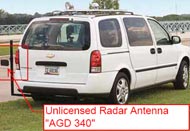Article from: www.thenewspaper.com/news/30/3046.asp
2/10/2010
Federal Judge Scolds Traffic Camera Companies
US District Court judge grows impatient with photo radar companies. Redflex countersues ATS.
 A US District Court judge on Monday in effect told the two largest photo enforcement firms that they need to act more like grown-ups. In November 2008, American Traffic Solutions (ATS) filed suit against its Australian competitor, Redflex Traffic Systems, alleging that the company won Arizona's statewide photo radar contract by lying in bid proposals regarding the use of radar units not certified by the Federal Communications Commission. US District Court Judge Frederick J. Martone decided in August that the suit had merit and should proceed to trial (view decision), but he showed signs of fatigue when faced with eleven separate motions and other items requiring judicial disposition Monday.
A US District Court judge on Monday in effect told the two largest photo enforcement firms that they need to act more like grown-ups. In November 2008, American Traffic Solutions (ATS) filed suit against its Australian competitor, Redflex Traffic Systems, alleging that the company won Arizona's statewide photo radar contract by lying in bid proposals regarding the use of radar units not certified by the Federal Communications Commission. US District Court Judge Frederick J. Martone decided in August that the suit had merit and should proceed to trial (view decision), but he showed signs of fatigue when faced with eleven separate motions and other items requiring judicial disposition Monday.
"The parties' approach to this action has been needlessly contentious from the beginning," Martone wrote. "The parties are advised to confer with each other to ensure that concerns are addressed promptly."
The judge chided Redflex for waiting until the last minute to file required pleadings, spending five hours uploading large documents beginning at midnight. The judge only took a shot at ATS for its failure to come to agreement with Redflex on a proposed protective order, even though both companies agreed with that the proceedings should be as secretive as possible. The judge felt otherwise.
"The parties assert that some financial information should be protected because they are market competitors," Martone wrote. "They also reference trade secrets, but fail to provide specifics... Both parties move for leave to seal nearly everything submitted in connection with defendant's motion for summary judgment. This is wholly inappropriate."
Under federal law, trial materials may only be sealed if the court finds a "compelling reason" supported by fact, not merely the desire of the parties involved. Precedents are even more strict in cases such as this one where government contracting is involved.
"The compelling reason standard is particularly apt in this case because it involves allegations that the citizens' public agencies were subjected to false advertising," Martone wrote. "The parties make no attempt to describe the specific portions of documents that they believe meet this high standard. Remarkably, they also fail to explain why the citizenry should not even have access to the statements of fact and plaintiff's response."
The judge granted and denied various motions by both Redflex and ATS in equal measure. Redflex responded to the ATS onslaught by filing a lawsuit against ATS at the very end of last year.
"Redflex invokes Section 43(a) of the Lanham Act and state law to compel American Traffic Solutions, Inc. to cease-and-desist in perpetuating its campaign to deceive consumers and thwart fair competition in the marketplace by falsely advertising and promoting its photographic traffic law enforcement services on a worldwide basis," Redflex wrote in its complaint. "Redflex also seeks both monetary and exemplary damages to hold ATS accountable for the injuries its willful misconduct has inflicted on Redflex, on consumers of photographic traffic law enforcement services, and on the public."
Redflex charges that the ATS claim that its red light cameras and speed cameras are "Made in America" is false because the main photographic component is manufactured by Nikon, a Japanese firm. ATS responded last week that Redflex had made no legitimate claim under federal law.
 A US District Court judge on Monday in effect told the two largest photo enforcement firms that they need to act more like grown-ups. In November 2008, American Traffic Solutions (ATS) filed suit against its Australian competitor, Redflex Traffic Systems, alleging that the company won Arizona's statewide photo radar contract by lying in bid proposals regarding the use of radar units not certified by the Federal Communications Commission. US District Court Judge Frederick J. Martone decided in August that the suit had merit and should proceed to trial (view decision), but he showed signs of fatigue when faced with eleven separate motions and other items requiring judicial disposition Monday.
A US District Court judge on Monday in effect told the two largest photo enforcement firms that they need to act more like grown-ups. In November 2008, American Traffic Solutions (ATS) filed suit against its Australian competitor, Redflex Traffic Systems, alleging that the company won Arizona's statewide photo radar contract by lying in bid proposals regarding the use of radar units not certified by the Federal Communications Commission. US District Court Judge Frederick J. Martone decided in August that the suit had merit and should proceed to trial (view decision), but he showed signs of fatigue when faced with eleven separate motions and other items requiring judicial disposition Monday.